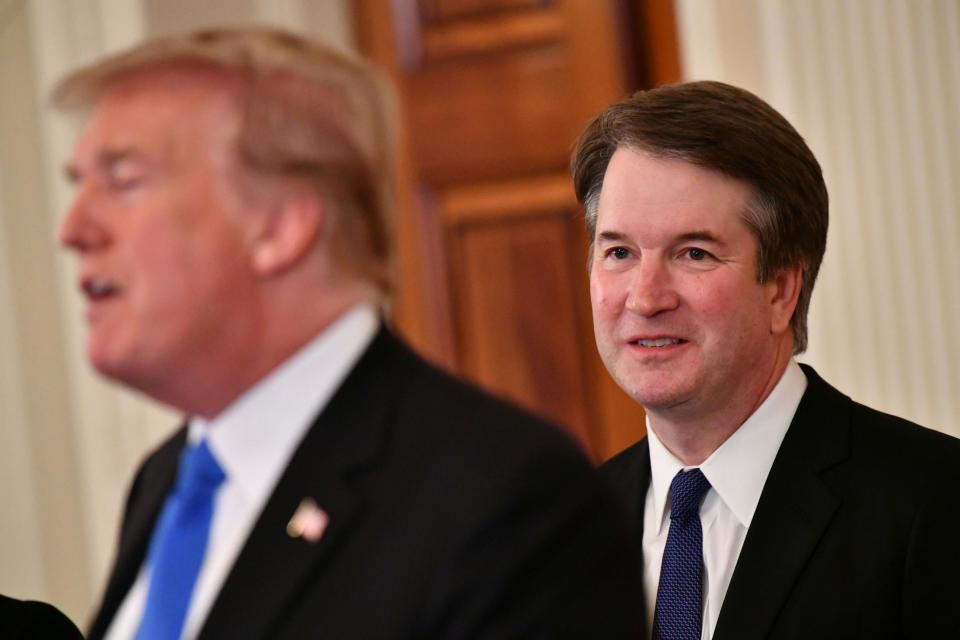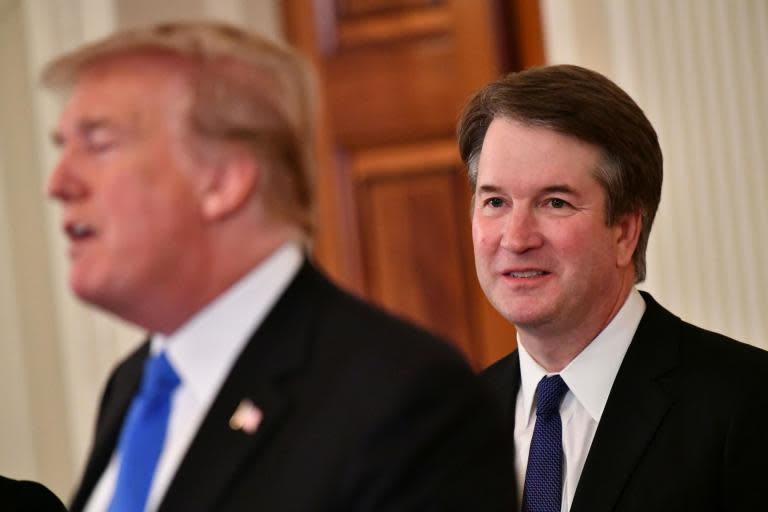Why Kavanaugh's confirmation controversy is already a win for Donald Trump and Republicans
It was little surprise Donald Trump was among the first to cheer when senators decided to press ahead with a confirmation vote for Brett Kavanaugh.
Ever since July when he announced he was nominating the 53-year-old judge for the seat being vacated by Anthony Kennedy – an announcement the former Apprentice host stage-managed by demanding everyone turn on their television sets at 9pm that warm summer evening – the president knew he would be a controversial choice.
He might have claimed Kavanaugh was a “judge’s judge”, someone with “impeccable credentials and unsurpassed qualifications”, but the man drawn from a list drawn up by White House counsel Don McGahn and the conservative Federalist Society, was always going to be contentious. While most Democrats opposed the confirmation of Neil Gorsuch the year before, Kavanaugh immediately attracted sterner opposition because opponents feared he was even more likely to roll-back key decisions such as Roe v Wade, which has guaranteed a woman’s right to a legal abortion.
Very proud of the U.S. Senate for voting “YES” to advance the nomination of Judge Brett Kavanaugh!
— Donald J. Trump (@realDonaldTrump) October 5, 2018
The abortions right group NARAL Pro-Choice America, described him as someone who would “risk our lives and our freedoms”.
Yet, while progressives may have hated the idea of Kavanaugh on the court, Trump and his advisers knew that to key parts of his constituency, evangelical Christians and conservatives, he would literally be seen a gift from heaven.
Trump has long known the rare power he holds in this regard.
“From day one, I’ve heard, outside of war and peace of course, the most important decision you make is the selection of a Supreme Court judge, if you get it,” he said this summer, even before he named Kavanaugh. “And as you know there have been many presidents that never got a choice. You know, they went four years, they went eight years and they never got a choice, and here we are at two already.”
It is not yet clear whether Kavanaugh will reach the bench of the nation’s highest court. On Friday, the senate decided by the thinnest of margins – 51-49 – to proceed with a confirmation vote over the weekend. Just one Democratic senator, Joe Manchin of West Virginia, voted to move the vote forward, and just one Republican, Lisa Murkowski of Alaska, voted against. If a vote is tied 50-50, vice president Mike Pence, himself an evangelical Christian, gets to cast the deciding ballot.
Manchin said on Friday that he would support the nominee in the final vote, as did the Republican swing-voters Susan Collins and Jeff Flake, moving Kavanaugh a step closer to his goal.
Yet in the event that Kavanaugh is not confirmed, Republicans will use the controversy over his candidature and the opposition to him as a means to rev up the base and ensure a high turn out in the midterm elections, now just four weeks away.
“If he does not get it, they will portray this as a political hit-job to try and get Trump’s base out,” Jeanne Zaino, a professor or political science at Iona College in New York, told The Independent. “And if he does get it, then evangelicals will likely come out to vote. Either way, they are going to try and use this to appeal to his base.”
Evidence of Trump’s thinking on this was revealed last week at a campaign rally in Mississippi, where he mocked Christine Blasey Ford, one of the women have accused Kavanaugh of sexual abuse. (He has denied the allegations.)
“How did you get home? I don’t remember. How’d you get there? I don’t remember. Where is the place? I don’t remember. How many years ago was it? I don’t know,” said Trump, making fun of her performance before the Senate Judiciary Committee.
Christina Greer said Trump’s sharp shift in tactics – just days before he had said her testimony was “very compelling and she looks like a very fine woman to me” – was an attempt to target Republican women who might have been thinking twice about coming out and voting. She said he was trying to “ensure they chose party over gender” by suggesting the allegations levelled at Kavanaugh could have been made at their sons or husbands. “It’s deliberate.”
There are signs this tactic of projecting Kavanaugh as a victim are already working, and that voter enthusiasm among Republicans – something that ia already high among Democrats – is rising quickly.
Mary Katharine Ham, a writer a The Federalist, a conservative news magazine, appeared on CNN after the senate moved Kavanaugh’s vote forward on Friday. “I think we are under-under-estimating the extent to which Republicans are energised by this,” she said. “You are starting to see it in things like the increase in donations to the [National Republican Congressional Committee.]
A recent NPR/PBS NewsHour/Marist, showed that 82 per cent of Democrats said the November elections were very important, compared with 80 of Republicans. The gap of two points had narrowed from ten in July.
Lee Miringoff, director of the Marist Institute for Public Opinion, told the Wall Street Journal: “There’s been a wake-up call to the Republican base.”


